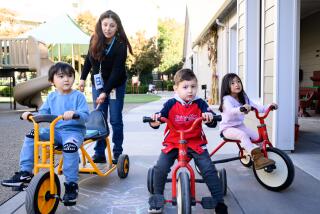Not the Paddle, but Maybe a Little Dose of Fear
- Share via
Could it be that we are ready to look again at discipline in schools, at what has been lost as well as gained since we banned the paddle? When I wrote about corporal punishment last week, I figured readers would take verbal whacks at what I had to say.
And a few did--accusing me of sentimentalizing abuse by teachers when I lamented the lack of discipline in schools and reminisced about my youth, when infractions brought swats with wooden paddles.
“Reading your column today made me so mad I can hardly see straight. Paddling is no way to reinforce good behavior,” wrote a Burbank mother. “It doesn’t teach respect for authority. It only teaches fear.”
But many readers weighed in with the sentiment that a little dose of fear wouldn’t hurt today’s kids.
“I really hate to sound provincial about this, but being a parent, not to mention 13 years of teaching, has convinced me that fear and shame, properly dispensed, are effective means for shaping and improving young personalities,” wrote a high school teacher, who graduated from Dominguez High in 1973, back when “if you messed up, you were whacked with a paddle or a ruler and that was the end of it.” These days, she said, “if there is a conflict [with a student], we must call conferences with the child, parents, administrators, school psychologists.”
And often parents presume that the school, not their child, is at fault, or refuse to see problem behavior for what it is. Parents whose kids flout the rules--or have none--at home are not likely to toe the line in school. And those who are well-disciplined at home don’t typically wind up in the principal’s office.
“Parents need to wake up and fulfill their responsibilities ... to teach their children right from wrong,” wrote a reader who has spent 26 years in law enforcement. “My biggest complaint is parents who will defend their child, regardless of the child’s outrageous conduct.”
Maybe the first place to look at discipline in schools is in the home.
After eight years in the classroom, “it still amazes me when I call a parent [about a discipline problem] to hear things like ‘I know, he talks to me like that at home, too.’ Or ‘I don’t know what you want me to do.’ Or ‘Are you calling my son or daughter a liar?’ ” wrote a Torrance high school teacher.
Teachers sometimes avoid calling home, she said, because it can add to the problem. “Rather than students returning the next day apologetic, they’re even more confrontational because they are mad you called their parents.”
Certainly, teachers aren’t always right, and children are sometimes wrongfully accused. But it undermines student discipline when parents take to chastising teachers. Said one veteran administrator, “When I have a parent who’s challenging me and defending the student, I send the young person out of the office and say [to the parent], ‘You and I may not agree, but we will not disagree in front of this child.”
A retired teacher from Santa Clarita remembers when swatting was sanctioned and parents were allies. He had a short list of behaviors that students knew would earn a paddling--and administered swats about a dozen times in the eight years his school allowed it. “Most of that time, when the dads heard about it, they added on one or two more,” he said.
Since then, he said, he’s run into many of the boys he swatted, “and all of them have thanked me for it.” One, who was paddled for stealing candy from the teacher and toy cars from some of his classmates, came back years later to tell him this story: “Across from his junior high was a 7-Eleven. Two buddies asked him to join them on a shoplifting spree. He said he suddenly ‘felt his butt tighten.’ ” He refused to go along; his classmates were later arrested.”
Fear can be a powerful motivator. I’ll never forget an interview I had years ago with a young man who had grown up under conditions that seemed to prime him for failure. He was raised by a single mother in a poor, dangerous neighborhood, surrounded by guns, drugs and gangs. Yet, while most of his buddies wound up on drugs, in jail or dead, he was heading to college.
“What kept you out of trouble?” I asked him. “Didn’t the gangs pressure you, too?”
Yes, he said, but so did his mother, who insisted he stay in school and off the streets. “And I was more afraid of my mother than I was the gangs.”
Certainly the decline in school discipline is not only the fault of parents or children or fluctuating social mores. Some teachers are better at keeping order than others. In their classes, children wouldn’t dream of cutting up.
But the challenges facing schools are greater today: Kids are more aggressive, families more troubled, society more tolerant of “anything goes.” And new teachers are being rushed into classrooms to cope with exploding student enrollment armed with little more than a few hours of training and a short list of classroom-management techniques.
Studies of effective school discipline show that campuses with the fewest behavior problems are those with clear, high standards, consistently applied; a “warm climate” of caring among students and staff; a schoolwide commitment to learning; and intolerance for behaviors that interfere with learning. A similar prescription ought to apply at home.
Perhaps that’s what soothed the sting of the swats my teachers delivered. I didn’t feel I was being paddled because the teacher hated kids or, as one reader suggested, “because they seemed to find pleasure in hurting us.”
I knew--because of the way they pushed, encouraged, listened and lectured--that my teachers cared about me, wanted me to succeed and knew that self-discipline was required for success. Yes, I was punished unfairly a time or two. But that taught me not to expect life to be fair, a lesson that has served me as well as anything else I learned in school.
So I’m not longing for a return of the paddle, but for an era in which schools are more orderly and our parents and teachers are on the same page.
*
Sandy Banks’ column is published Sundays and Tuesdays. Her e-mail address is [email protected].
More to Read
Sign up for Essential California
The most important California stories and recommendations in your inbox every morning.
You may occasionally receive promotional content from the Los Angeles Times.










